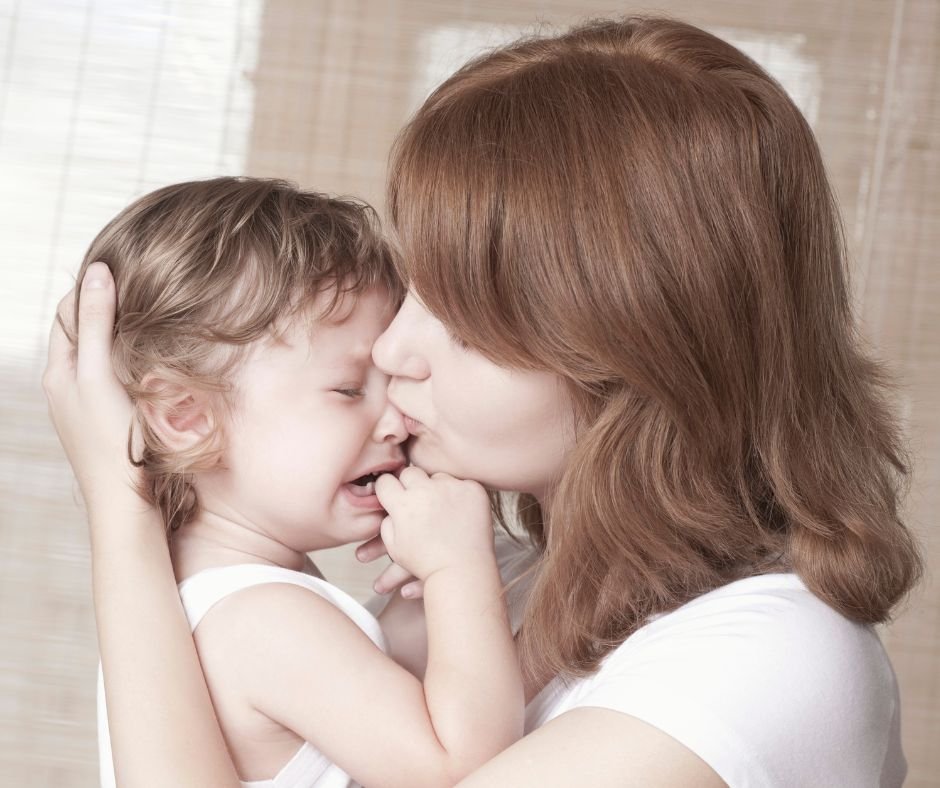When Toddler Emotions Feel Too Big (and What Really Helps)
You’re in the supermarket queue, juggling bananas, a toddler, and the faint hope of getting home before the meltdown hits. And then it does. Right there, between the crisps and the chewing gum. Arms flailing, face red, volume turned up to maximum. You can feel the eyes on you, and you’re wondering if everyone else thinks your toddler is spoiled, manipulative, or that you’ve “lost control.”
Here’s the truth: your toddler isn’t giving you a hard time. They’re having a hard time.
That meltdown isn’t about making your life difficult. It’s about emotions that feel too big for their little bodies to hold. And when those feelings flood in, logic goes straight out the window. No amount of reasoning, bribing, or “use your words” pep talks are going to land in that moment, because their brain simply isn’t ready to calm itself yet.
For more about what to do during (and after) a tantrum, see Riding the Wave: What to Do During (and After) a Toddler Tantrum
Are toddlers manipulative, or just overwhelmed?
One of the biggest myths I hear is that toddlers “push your buttons on purpose.” But toddlers don’t have the brain development for calculated manipulation. What they do have is raw emotion - frustration, fear, excitement, tiredness - and not a lot of tools to manage it.
When they lash out, flop dramatically on the floor, or scream as if you’ve just ended their world by offering the wrong colour cup, what they’re really saying is: “This is too much for me. I need your help.”
Toddler tantrums don’t mean you’re failing
Here’s the part parents often need to hear most: your toddler’s big feelings don’t mean you’re failing. Meltdowns are part of healthy development.
If you want to explore how boundaries and connection stay intact during tantrums, check out Gentle Parenting Through Tantrums: Why Your Child’s Meltdown Doesn’t Mean You’ve Failed
In fact, research shows that toddlers can’t fully regulate their emotions on their own until well into their twenties (yes, really - you’ll have a teenager one day and still be borrowing your calm for them!).
So no, you don’t need the perfect script or the magic strategy that makes tantrums vanish. What your child needs is you - your steady presence, your calm voice, your ability to ride out the storm with them until the feelings pass.
Why society gets toddler behaviour wrong
Part of why toddler emotions feel so hard is because society tells us they shouldn’t happen at all. Parents are expected to raise children who are polite, calm, and well-behaved in every situation, even though no adult manages that, let alone a two-year-old.
But here’s the thing: it’s actually healthy for toddlers to experience their full range of emotions in a safe, supportive environment while they’re young.
Suppressing feelings doesn’t make them disappear - it just teaches children to hide them. When toddlers are allowed to express big feelings with a parent alongside to steady them, they’re learning the lifelong skill of working through emotions rather than shutting them down.
So instead of seeing a meltdown as a failure, think of it as practice. Practice in feeling, expressing, and eventually recovering from strong emotions - with your calm presence as their anchor.
Two simple strategies for calming toddler emotions
You don’t need a long list to get started - sometimes just one or two tools can make all the difference. Here are a couple of simple ideas you can tuck into your back pocket:
Hand breathing – Hold up your hand like a starfish. Trace each finger slowly with your toddler’s other finger, breathing in as you go up, and out as you go down. It’s playful, visual, and sneaks calm into a tense moment.
When… then – Instead of a flat “no,” try: “When you’ve put your shoes on, then we can go to the park.” It sets a clear boundary but gives your toddler the order of events in a way that feels predictable, not punishing.
These aren’t cure-alls - nothing is with toddlers - but they can take the edge off the biggest moments and give you a little more breathing space.
Helping toddlers handle big feelings
Toddlers borrow our regulation until they grow their own. That means your calm is contagious, your connection is powerful, and your presence is enough.
If you’re wondering how confidence and connection support sleep, you may like How to Feel More Confident About Baby Sleep (Without Sleep Training or Guilt)
So next time the meltdown rolls in, instead of asking “How do I stop this?” try asking: “How can I help my child feel safe while the storm passes?”
You don’t need perfection. You just need to be there. And that, in itself, is what really helps.
Want more support with your toddler emotions?
If this resonates, my brand new course with four recorded sessions you can watch anytime is coming soon. Each one is split into bite-sized chunks and paired with a companion guide, covering emotions, sleep, eating, and big transitions.
At a special launch price of just £27 but only until 16th October




